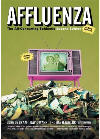Affluenza: The all-consuming epidemic
 |
Author: John De Graaf, David Wann and Thomas H Naylor |
I live in a town with around four hundred pubs and bars. Relax! I haven't chosen this forum to come out as an alcoholic. My point is that deciding where to meet up with someone is a case of being spoilt for choice. It would be easier in fact to have less choice. Actually, it's been shown that too much choice can leave people feeling dissatisfied with the choices they do make. (1) A world of possibilities is also a world of missed opportunities.
In industrialised countries the days are long gone of Henry Ford's famous dictum: 'You can have any colour car as long as it's black'. There are endless multiple, constantly updated, choices from financial services to mobile phones, from possible dating partners (who could be anywhere in the world) to flavours of ice cream. Affluenza: The all-consuming epidemic is a thought-provoking examination of what it means to be 'ill' in a modern society suffering from "a painful, contagious, socially-transmitted condition of overload, debt, anxiety and waste resulting from the dogged pursuit of more."
'Affluenza' is defined as a social virus causing waste, massive debt, constant dissatisfaction and work obsession. It threatens families, communities and the whole planet as non-material values are marginalised and notions of personal 'self-improvement' have switched away from 'what I am' to 'what I have'.
Although the book focuses on America specifically, the rampant materialism and pressure to constantly acquire more and the consequences of this cycle could apply to anyone in the industrialised world (the average Brit is £8,000 in debt, discounting mortgages). The book looks at the social and psychological consequences for all of us of just focusing on getting more stuff to enjoy the short-lived buzz of 'gaining' – to be followed so soon after with yet more 'wanting'.
The authors investigate how over-consumption spoils relationships and even whole lives, and looks at a number of possible solutions. We have never had so much – and yet really it amounts to so little when you consider that, although most of us enjoy luxuries which even royalty could not have dreamed of a hundred years ago, rates of suicide and depression have never been so high.
This is a good read that will make you think hard about society, yourself and the people in your life.
(1) That's particularly true when it comes to the workplace, says Barry Schwartz, author of six books about human behaviour. Students graduate with a multitude of skills and interests, but are often overwhelmed when it comes to choosing an ultimate career goal. In a study, Schwartz observed decision-making among college students during their senior year. Schwartz identified two main 'camps' from their r job-hunting strategies and career decisions: the 'maximisers' who consider every possible option, and the 'satisficers' who look until they find an option that is 'good enough'. You might expect that the students who'd undertaken the most exhaustive search would be the most satisfied with their final decision. But this was not the case. Schwartz found that while maximizers often ended up with better paying jobs than satisficers, on average they were not as happy with their decision.








